|
|
|
Sort Order |
|
|
|
Items / Page
|
|
|
|
|
|
|
| Srl | Item |
| 1 |
ID:
153580
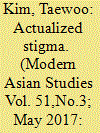

|
|
|
|
|
| Summary/Abstract |
During the Open Port period and Japanese colonial period (1876–1945), Koreans generally had a positive image of the United States. This positive view of the United States held by Koreans persisted until after liberation from Japanese colonial rule in 1945. The United States was a ‘liberator’ that saved the Koreans, and was viewed as ‘a cooperator’ with whom Korea was to solve its national task of establishing a new country. However, the concept of ‘American imperialist warmonger’ had begun to be promoted in North Korea from 1948–49. It was a concept advanced by the Soviet Union and the North Korean leadership. The negative image of the United States, which spread throughout North Korea from the early years of the Cold War, was merely a perplexing stigma lacking substantiated grounds. However, the experiences of the Korean War actualized the image of the United States as a ‘warmonger’ in the hearts of the North Korean people. Alleged indiscriminate aerial bombings, mass slaughters, sexual assaults, and arson attacks against Korean civilians became the most important reason for the expansion of intense sentiment. Anti-Americanism began to be systemized and routinized in every aspect of North Korean life after the Korean War.
|
|
|
|
|
|
|
|
|
|
|
|
|
|
|
|
| 2 |
ID:
153585
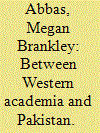

|
|
|
|
|
| Summary/Abstract |
In the wake of European colonization, Muslims across the globe have wrestled with the problem of intellectual dualism, or the bifurcation of knowledge into the distinct Islamic and modern Western spheres. This article examines the career of Pakistani intellectual and University of Chicago professor, Fazlur Rahman (1919–1988), who emerged as a particularly significant figure in this debate over intellectual dualism in the latter half of the twentieth century. Arguing that academic methodologies were integral for Muslim understandings of Islam, Rahman broke down the dichotomy between Western and Islamic knowledge in favour of a merging of the two, an approach I term ‘fusionism’. He propagated this fusionist vision, with mixed success, in his native Pakistan and across the Islamic world. In his position as a respected professor at the University of Chicago, Rahman furthermore re-imagined and utilized the Western university as a valuable space for modern Islamic thought, thereby challenging any sharp boundary between the two discourses and their respective institutions.
|
|
|
|
|
|
|
|
|
|
|
|
|
|
|
|
| 3 |
ID:
153584
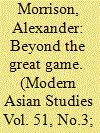

|
|
|
|
|
| Summary/Abstract |
Drawing on published documents and research in Russian, Uzbek, British, and Indian archives, this article explains how a hasty attempt by Russia to put pressure on the British in Central Asia unintentionally triggered the second Anglo–Afghan War of 1878–80. This conflict is usually interpreted within the framework of the so-called ‘Great Game’, which assumes that only the European ‘Great Powers’ had any agency in Central Asia, pursuing a coherent strategy with a clearly defined set of goals and mutually understood rules. The outbreak of the Second Anglo–Afghan war is usually seen as a deliberate attempt by the Russians to embroil the British disastrously in Afghan affairs, leading to the eventual installation of ‘Abd al-Rahman Khan, hosted for many years by the Russians in Samarkand, on the Afghan throne. In fact, the Russians did not foresee any of this. ‘Abd al-Rahman's ascent to the Afghan throne owed nothing to Russian support, and everything to British desperation. What at first seems like a classic ‘Great Game’ episode was a tale of blundering and unintended consequences on both sides. Central Asian rulers were not merely passive bystanders who provided a picturesque backdrop for Anglo–Russian relations, but important actors in their own right.
|
|
|
|
|
|
|
|
|
|
|
|
|
|
|
|
| 4 |
ID:
153583


|
|
|
|
|
| Summary/Abstract |
While the debates about the use of a single script for rendering the Marathi language became relevant only after the advent of printing, the fast-changing social and political landscapes of the nineteenth and twentieth centuries lent their own weight to the discourse. The debates about the writing system became the venue for various competing social forces and political movements. The issues of region, caste, class, and religion—the core of today's identity politics—were all embroiled in this debate, as were both the British colonial and Indian nationalist governments. In just 150 years, Balbodh (a variant of Devanagari) emerged as the sole script for the Marathi language. At least three different arguments were used to dismiss the Modi script. The first was about printing types, and the legibility and economy of Devanagari. By the end of the nineteenth century, the social empowerment of the literati and administrative convenience were the reasons given for abolishing Modi. In the twentieth century, British resistance to nationalist efforts in western India, and then a fear of regionalism under the new nationalist independent republic, ensured that a single script able to be used for both Hindi and Sanskrit would be officially sanctioned for Marathi.
|
|
|
|
|
|
|
|
|
|
|
|
|
|
|
|
| 5 |
ID:
153582


|
|
|
|
|
| Summary/Abstract |
Entries in Mao Era reference works today serve as windows into the world of words and meanings of a bygone era. Dictionaries and encyclopaedias, though, did not speak with one voice, even under Communist Party control. Lexicography and the question of who would get to publish on and explain the meaning of the ‘new terms’ and ‘new knowledge’ of ‘New China’ were subject to constant debates. Lexicographers, editors, and publishers specialized in the business of setting up categories and, together with readers and state censors, they policed them. Following on their heels, this article examines four moments in Mao Era lexicography, ranging from the early years of transition to Chinese Communist Party rule to the height of the Great Proletarian Cultural Revolution. Internal reports and letter exchanges on the production and circulation of single-volume encyclopaedic dictionaries show who contributed to encyclopaedic work, how it was controlled, and why control and censorship were often far from simple. Taking lexicography seriously as a component of the socialist information economy after 1949 sheds light on complex processes of knowledge transmission that defy simple models of socialist state propaganda.
|
|
|
|
|
|
|
|
|
|
|
|
|
|
|
|
| 6 |
ID:
153581
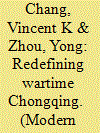

|
|
|
|
|
| Summary/Abstract |
This article examines the historical role and legacy of the foreign establishment in China's temporary capital Chongqing during the Chinese War of Resistance against Japan and the Second World War. This extraordinary episode, lasting from 1938 to 1946, ushered in a new era for China's foreign diplomacy and laid the foundation for its rise to world-power status. Placing Chongqing at the very heart of this epochal chapter in modern Chinese history, this article describes the major events, trends, and actors that directly or indirectly were instrumental to China's wartime transformation from a partitioned, de facto colony to a first-rate global power with a permanent seat among the ‘Big Five’. Seventy years after the end of the Second World War, this article presents fresh perspectives on a near-forgotten episode of China's war experience. Moving beyond the traditional typecasting of ‘Chungking’ as a primitive backwater in China's remote hinterland, this article reappraises wartime Chongqing as a major international centre at the spearhead of global change and as an important cradle of the modern power that China is today.
|
|
|
|
|
|
|
|
|
|
|
|
|
|
|
|
| 7 |
ID:
153586
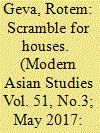

|
|
|
|
|
| Summary/Abstract |
The partition riots that erupted in Delhi following independence in 1947 resulted in the massacre of thousands of Muslims and the departure of roughly 300,000, leaving the remaining Muslim community seriously depleted, both numerically and politically. The article investigates the spatial aspect of Muslim minoritization in the city, namely their ghettoization, resulting from ongoing struggles over Muslim houses. It traces the gradual encroachment on the Muslim-majority neighbourhoods designated ‘Muslim zones’. An analysis of this dynamic reveals that, contrary to the prevalent assumption that Muslim zones were outside the jurisdiction of the Custodian of Evacuee Property, a great deal of the Custodian's intervention took place precisely in these areas. This investigation also reveals that, in addition to civic violence and the bureaucratic violence of the Custodian, a host of other factors played a significant role in determining the geography and intensity of encroachment—namely deep political divisions that cut across all levels of governance and policing, as well as socioeconomic class, informal economy, and corruption. This divided political, bureaucratic, and social landscape reflected the profound uncertainties underlying the process of decolonization, and sustained the violence that lingered on long after the partition riots had ended according to official narratives.
|
|
|
|
|
|
|
|
|
|
|
|
|
|
|
|
| 8 |
ID:
153587


|
|
|
|
|
| Summary/Abstract |
In April 1839, 29 Muslims in Vellore (South India) accused their maulvi, Sayyid Shah Modin Qadiri, of preaching seditious sermons in his mosque, which exhorted Muslims to wage jihad against the ruling East India Company. The ensuing criminal trial of Maulvi Modin illustrates key aspects of liberal imperialism as it was interpreted and implemented in pre-Mutiny India. As a central ideology of the British empire, liberalism championed the rights and freedoms of rational individuals and constraints on state power. At Modin's trial, however, this framework did not lend itself to a sanitary, evidence-based enquiry that bracketed the identities of the accused or the accusers. Rather, the trial measured a Muslim's place within networks of patronage that ensured namak halal, or the bonds of loyalty between rulers and subjects. Far from being a post-Enlightenment adjudication of guilt or innocence, his trial reveals the Company's investment in a particular kind of social order maintained by its scrutiny of class backgrounds and its patronage of traditional identities—a fact that softens the distinction often made between a commitment to liberal transformation before the Great Rebellion of 1857 and a return to conservatism afterwards.
|
|
|
|
|
|
|
|
|
|
|
|
|
|
|
|
|
|
|
|
|